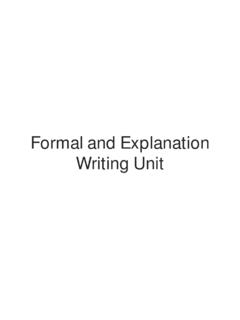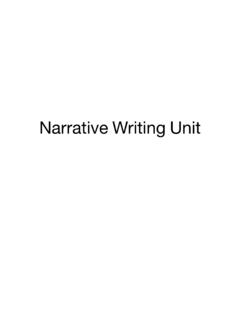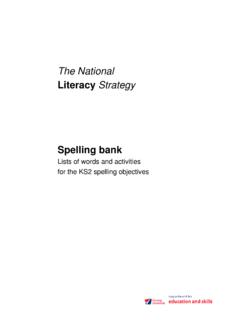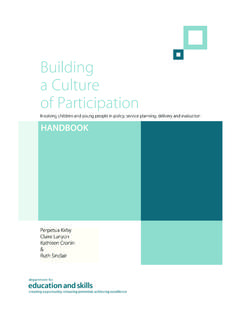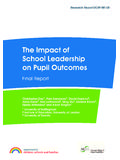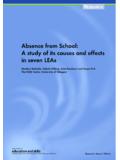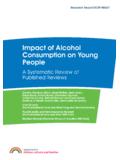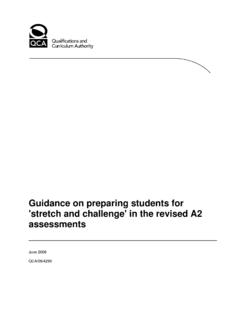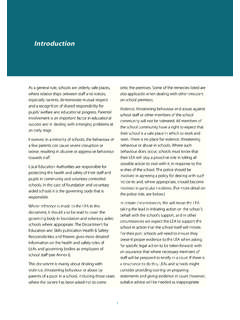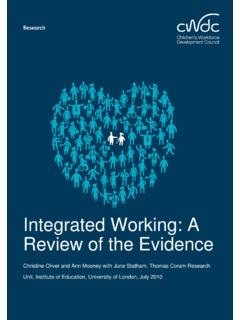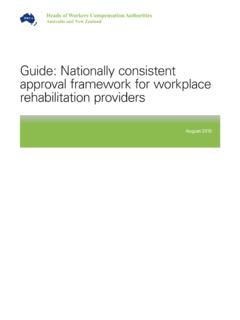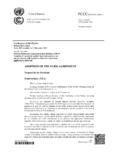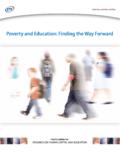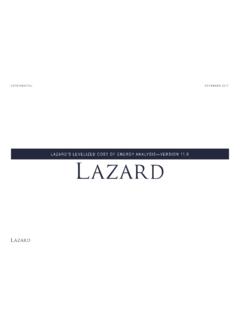Transcription of Specification for nationally approved training for Special ...
1 Specification for nationally approved training for Special educational needs coordinators (SENCOs) new to the role, leading to the award of the National Award for SEN. Coordination Contents Page Introduction 2. Section 1: Guidance on the criteria training providers must 7. meet Section 2: The requirements for training providers 8. Section 3: The learning outcomes for SENCOs successfully 12. completing nationally approved training 1. Specification for nationally approved training for SENCOs new to the role, leading to the award of the National Award for Special Educational Needs Coordination Introduction 1. Teachers taking the role for coordinating provision for pupils with Special educational needs (SEN) in a school Special educational needs coordinators (SENCO) need to be effective in leading teaching and learning and coordinating provision for pupils with SEN and/or disabilities in their schools;. supporting and managing other staff; and ensuring that pupils receive high quality educational provision that enables them to make progress in their learning and towards the Every Child Matters outcomes of: being healthy staying safe enjoying and achieving making a positive contribution, and achieving economic well-being.
2 2 This Specification for nationally approved training for SENCOs new to the role (hereafter referred to as national SENCO training ') sets out the requirements that all participants and training providers must meet in order to support SENCOs' professional development for the role. 3 To achieve the National Award for SEN Coordination the Department for Children Schools and Families (DCSF) requires that teachers should meet all the learning outcomes in Criterion 6 of this Specification . The nationally approved SENCO qualification should be validated at Masters level, and provide 60 credits. The length of time required to complete the training will depend on participating SENCOs' prior experience, knowledge, understanding and skills. We expect that it will take about one year, part time to complete national SENCO training for an eligible teacher starting from scratch', without accreditation for prior learning and experience. 4 It is envisaged that an eligible teacher will normally have up to three years in which to complete their national SENCO training .
3 This will be subject to consultation on draft Regulations setting out the requirements on school governing bodies with respect to mandatory training for SENCOs coming new to the role. 5 The Specification recognises that schools organise provision for pupils with SEN. and/or disabilities in different ways to suit their particular circumstances and that some functions associated with the SENCO role will often be carried out by other staff, including support staff, who make an important contribution to improving outcomes for pupils with SEN. The Specification for national SENCO. training is designed to help new SENCOs fulfill the responsibilities set out in the SEN Code of Practice. The learning outcomes set out in Criterion 6 of this 2. Specification relate to role of the SENCO in leading teaching and learning and leading the coordination of provision for pupils with SEN and/or disabilities. They exclude administrative tasks. 6 To deliver national SENCO training , training providers must be approved for this purpose by the Secretary of State and all applications must show how the programme will gain academic accreditation by an HEI.
4 The TDA welcomes and encourages applications to run national SENCO training for SENCOs from consortia/partnerships in which skilled and experienced practitioners with current, relevant expertise, from mainstream and Special schools, local authorities or other bodies, take an active and substantial role in training .. 7 training providers must apply and be approved to run national SENCO training . TDA, on behalf of the DCSF, will periodically invite training providers to apply for approval. Providers wishing to run national SENCO training must then submit an application demonstrating how their provision will meet the requirements of the Specification and how it will help teachers meet the required learning outcomes set out in Criterion 6. Each application will be assessed by a panel including, representatives from TDA, DCSF and professionals with experience of teaching and learning for pupils with SEN and/or disabilities. 8 Providers should bid to deliver national SENCO training starting from September 2009, however courses starting later than this will be considered (eg January 2010, September 2010) where circumstances warrant that.
5 Approvals will be up to September 2013 initially. approved training will be monitored by the TDA and may also be inspected by Ofsted. approved providers will be required to keep a record of teachers who obtain the National Award for SEN. Coordination. 3. Section 1: Guidance on the criteria training providers must meet The Specification (section 2) sets out the information that providers should include in their application to run national SENCO training . The Specification contains six main criteria, with the specific features required for each set out underneath. Potential providers should show how their proposed provision meets the Specification by addressing specifically and in turn: each of the main criteria, and each of the numbered points set out under the main criteria. The statements made in respect of each criterion will be used to decide which providers will be approved to deliver national SENCO training . Criterion 1. The main objective of national SENCO training should be to increase the participation of pupils with SEN and/or disabilities and raise their achievement 1 , through developing SENCOs' professional attributes and improving their knowledge, understanding and skills 1.
6 training should reflect the principles of Every Child Matters 2 by giving SENCOs the knowledge, understanding and skills they need to maximise the opportunities open to pupils with SEN and/or disabilities to improve their life chances and fulfil their potential. Throughout the Specification , the achievement' of pupils includes achievement in relation to all five Every Child Matters outcomes: being healthy, staying safe, enjoying and achieving, making a positive contribution and achieving economic well-being. It does not refer only to academic attainment. National SENCO training should also prepare participants to listen to the views of pupils and to work together with others, including other professionals, parents/carers and families, to protect pupils, include them and help them to achieve. 2. National SENCO training must help prepare SENCOs to lead teaching and learning and the coordination of provision for pupils in their school who have SEN and/or disabilities.
7 It should help the SENCO to become a key and reassuring point of contact for parents of children with SEN and/or disabilities. 3. training should be strongly rooted in effective practice in schools to ensure that it is up to date, relevant and enables SENCOs to carry out their role to a high 1. Throughout this document the achievement' of children and young people should be taken to include achievement in relation to all five Every Child Matters outcomes, not just academic attainment. 2. Every Child Matters: Change for Children, HMSO, (2004). 4. standard. It should, for example, be delivered by people with relevant, current experience, expertise and skills; reflect reliable and valid evidence about effective teaching and learning; include opportunities for SENCOs to apply theory to practice, undertake practical activity in their own school and evaluate and improve their practice; and learn from effective practice in other settings. It is expected that most of the training will be school based.
8 4. training should promote evidence-based practice by equipping SENCOs to evaluate research and other sources of evidence about practice in relation to provision for pupils with SEN and/or disabilities critically, and to identify and build on what works best in their own schools to improve practice. Criterion 2. Providers should match provision closely to SENCOs' identified training and development needs, promote progression towards the required outcomes and make best use of available resources. 5. training should have the maximum possible impact on SENCOs' practice, school improvement and the outcomes achieved by pupils with SEN and/or disabilities. SENCOs will come to the training from different backgrounds. They will work in a range of different contexts and have varying knowledge, skills and professional experience. As a result, they will have different strengths and training needs in relation to the required learning outcomes (see criterion 6).
9 6. To ensure that training provides well-targeted and cost-effective professional development for all participants, it should commence with an initial needs assessment in relation to the required learning outcomes set out in Criterion 6. The results of that needs assessment should be used to help providers tailor the course to participants' needs and circumstances, taking full account of their prior knowledge and experience. For example, providers might make best use of the available training time by suggesting research, reading, assignments and/or visits to enable each participating SENCO to focus on areas most relevant to their needs. 7. Regardless of the results of the initial needs assessment, providers should look for evidence of participants' learning against all the required outcomes throughout the training programme. By the end of the programme, all participants will need to demonstrate that they meet all the learning outcomes set out in criterion 6.
10 8. National SENCO training is designed primarily to address the training needs of SENCOs new to the role 3 . However, it is likely that SENCO training will also attract skilled and experienced SENCOs who will be able to demonstrate some or all of the required learning outcomes with little or no further training . Providers should, therefore, have arrangements in place for such SENCOs to 3. [Under regulations which DCSF will be consulting on, New to the role' is likely to mean taking up the lead SENCO responsibilities in the one year period up to September 2009 (the expected coming into force date for the regulations) or at any point thereafter]. 5. be considered for the award of the qualification without undergoing the full programme, taking account of their prior experience and learning. Providers should also consider how to preserve the credibility of APEL as a route to national accreditation, by ensuring that their judgments are well-founded, rigorous and consistent.
